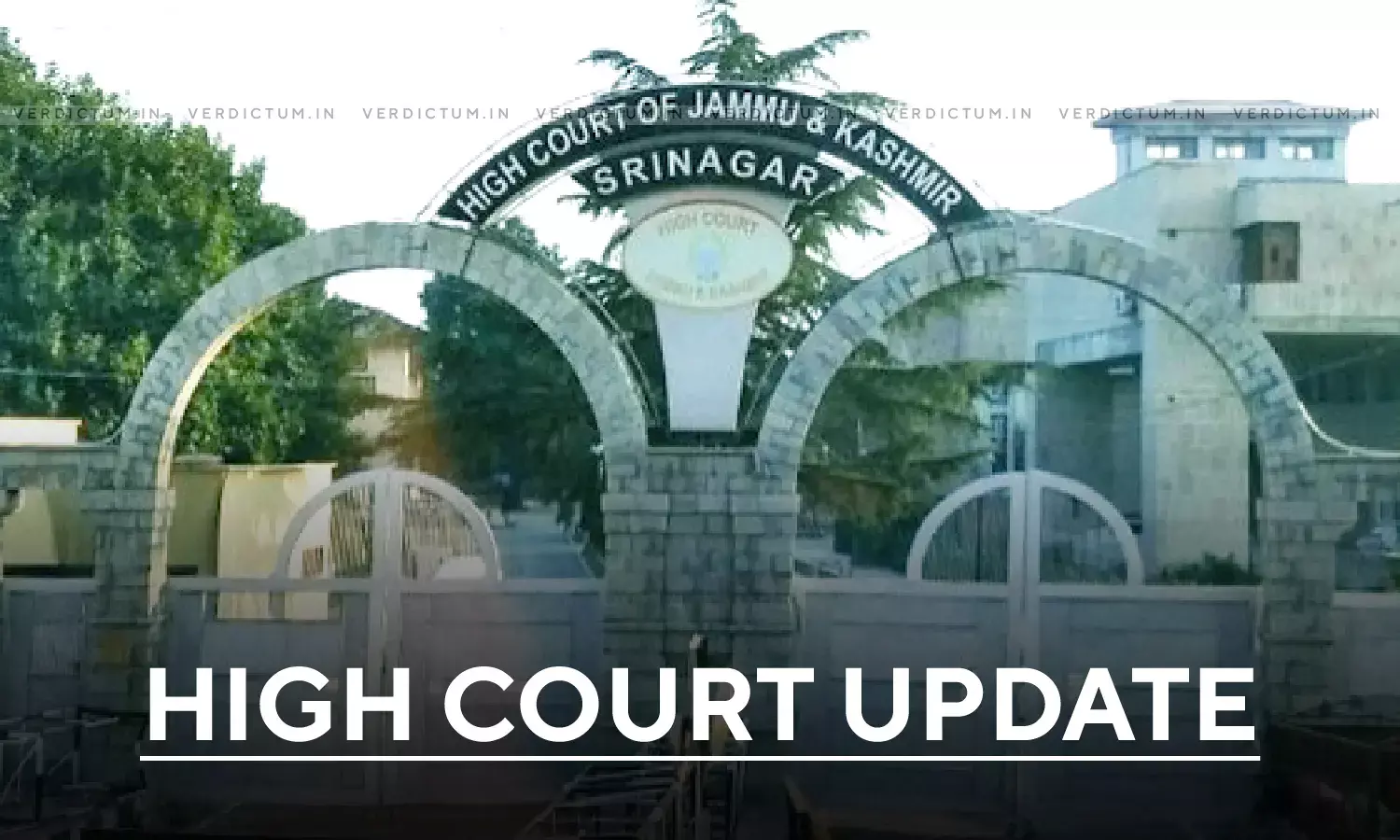Scope Of Necessary Party In Writ Petition Is Much Wider Than In Civil Suits: J&K&L High Court
The Jammu and Kashmir and Ladakh High Court remarked that the scope of necessary party in a Writ Petition is much wider than in Civil Suits.
The Court remarked thus in an appeal against the order of the Single Judge by which the application for seeking impleadment as party Respondents in the writ petition was dismissed.
A Division Bench of Justice Tashi Rabstan and Justice M.A. Chowdhary said, “The Writ Court cannot keep itself confined merely to the litigants appearing before it or on the record available nor will it keep itself confined only to the lis before it, but will also take into account the consequences or the effect which the decision will have or is likely to have on the interests of others who may not be wholly necessary for decision of the issue at hand, but whose interests would be vitally affected in consequence of the decision rendered in the Writ Petition. Viewed from this angle, the concept of necessary party in a purely Civil Suit and a Writ Petition cannot be one and the same. Far from this, the scope of necessary party in the Writ Petition will be much wider than in the Civil Suits. The High Court, invoking Writ jurisdiction, looks beyond the parties appearing before it and must ensure that not only the persons, who are essential for the purpose of the disposal of the case, but also those, who will be vitally affected by the order to be passed, are made parties so that nothing is decided behind their back.”
Advocate Areeb Javed Kawoosa appeared on behalf of the appellants while Senior AAG Mohsin-ul-Showkat Qadri appeared on behalf of the respondents.
Factual Background -
The Writ Petitioners/contesting Respondents filed Writ Petition invoking Writ jurisdiction of the High Court seeking a direction upon the official Respondents to refrain and forbear from causing any kind of interference with the process of filling of the land situated in a village. It was recorded as ‘Nambal’ and ‘Maidani’ in the revenue records, so as to enable them to make the said land cultivable or develop the same into an Orchard or use it for any industrial or commercial activity and earn a better living, guaranteed to them by Articles 14, 19 and 21 of the Constitution.
In the Writ Petition, it was contended that the Writ Petitioner Nos. 1 to 6/ Respondent Nos. 1 to 6 were owners in possession of land measuring 32 Kanals and 05 Marlas covered under different Survey numbers situated at Village Suzeth Goripora, Tehsil Narbal, District Budgam, recorded as ‘Nambal’ in the revenue records, whereas, the Writ Petitioner Nos. 7 to 11/ Respondent Nos. 7 to 11 were claimed to be owners in possession of land measuring 99 Kanals and 12 Marlas covered under different Survey numbers situate at Village Rambirgarh, Srinagar, recorded as ‘Maidani’ in the revenue records. The appellants in their application before the High Court sought impleadment as party Respondents in the Writ Petition claiming that their interests were involved being the owners of land falling adjacent to that of petitioners. As the same was dismissed by Single Bench, they approached the Division Bench.
The High Court in the above context of the case observed, “Since, the matter involved in this appeal is with regard to an application seeking impleadment as party Respondents in a Writ Petition, therefore, it is to be seen as to whether the principles provided for impleadment of parties in the Code of Civil Procedure can be made applicable to the Writ proceedings.”
The Court said that there being no separate statutory provision with regard to such subject on Writ Petitions, as such, the baseline to be accepted is that of the provisions of the Code of Civil Procedure (CPC) are to be kept in mind, however, the concept of necessary party in a purely Civil Suit and a Writ Petition cannot be one and the same, as scope of necessary party in a Writ Petition is much wider than in the Civil Suit and persons to be vitally affected by the Order to be passed by the Writ Court are necessary parties.
“Keeping in view the above-mentioned broad principles governing the concept of necessary party in a Petition under Article 226, this Court is required to consider the aspect of the matter as to whether a person or a party is or is not a necessary party to a proceeding is not always a mere question of law, rather it can really be a mixed question of facts and law. While considering this aspect of the matter, it is of paramount importance to note that in dealing with the subject matter of the Writ Petition relating to improving/ developing their land by the Petitioners, the Writ Court was not concerned with the title of the Applicants/ Appellants, but the rights and interests, if any of the Applicants/ Appellants”, it noted.
The Court enunciated that unlike in a Civil Suit, for being a proper or a necessary party, where the applicant has to show a fair semblance of title or interest, the applicant, in a Writ Petition, has to satisfy the Court as to whether the applicant will be vitally affected by the decision to be taken in the Writ Petition.
Accordingly, the High Court allowed the application and set aside the impugned order.
Cause Title- Farooq Ahmad Sheikh & Anr. v. Tariq Ahmad Malik & Ors.
Appearance:
Appellants: Advocate Areeb Javed Kawoosa
Respondents: Senior AAG Mohsin-ul-Showkat Qadri and Advocate A. Qayoom.




